In navigating the world of portable power solutions, two notable options from Westinghouse emerge: the Dual Fuel Generator and the Tri-Fuel Generator. Both models are designed to provide reliable energy, yet they differ significantly in fuel versatility, output capacity, and features. In this comparison, I aim to explore their respective strengths and weaknesses, allowing potential users to make an informed decision based on their specific energy needs and operational preferences.
Home Backup
The Westinghouse 12500 Watt Dual Fuel Home Backup Portable Generator offers reliable power with up to 12 hours of run time and impressive wattage, making it ideal for home backup or RV use. With convenient features like remote start, multiple receptacles, and a durable engine, it ensures safety and ease of use during power outages.
Home Backup
The Westinghouse Outdoor Power Equipment Tri-Fuel Generator offers versatile power options, delivering up to 14,500 peak watts and running efficiently on gasoline, propane, or natural gas. With a robust engine and the ability to run for up to 19 hours on a single tank, it is an ideal backup power solution for larger homes or portable use.
Westinghouse Dual Fuel Generator
Peak and Running Wattage
12500 peak watts, 9500 running watts (gasoline); 11200 peak watts, 8500 running watts (propane)
Fuel Types Supported
Gasoline and Propane
Runtime on Fuel Tank
12 hours on a 6.6-gallon tank
Engine Specifications
457cc 4-Stroke OHV Engine
Included Components
Battery Charger, LPG Regulator, Key FOB, Oil & Funnel, User’s Manual
Westinghouse Tri-Fuel Generator
Peak and Running Wattage
14500 peak watts, 11500 running watts (gasoline); 13500 peak watts, 10500 running watts (propane); 12000 peak watts, 9500 running watts (natural gas)
Fuel Types Supported
Gasoline, Propane, and Natural Gas
Runtime on Fuel Tank
Up to 19 hours on a 9.5-gallon tank
Engine Specifications
550cc 4-Stroke OHV Engine
Included Components
Not specifically listed, but includes necessary components for operation
Westinghouse Dual Fuel Generator
Westinghouse Tri-Fuel Generator
Westinghouse Dual Fuel Generator
Westinghouse Tri-Fuel Generator
Feature comparison chart

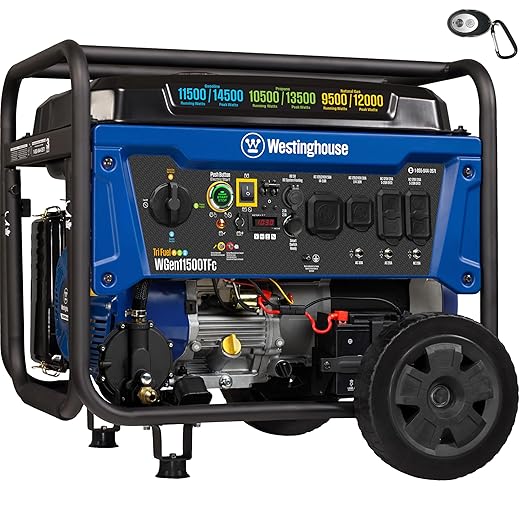
Unique Selling Points
Westinghouse 12500 Watt Dual Fuel Generator
- Dual Fuel Capability: Operates on gasoline or propane effortlessly.
- High Peak Wattage: Ideal for powering essential home appliances during an outage.
- Carrying Handle: Enhanced portability for outdoor activities.
Westinghouse 14500 Watt Tri-Fuel Generator
- Tri-Fuel Versatility: Offers flexibility with three fuel options – gas, propane, and natural gas.
- Higher Peak Capacity: Can support larger household needs, especially during extended outages.
- Environmentally Friendly: Lower emissions when using natural gas compared to gasoline.
Similarities
- Both generators feature a remote electric start for convenient operation.
- Both are transfer switch ready, ensuring they can be integrated easily into home electrical systems.
- Each has a 3-year warranty, demonstrating the manufacturer’s confidence in their products.
Pros and Cons
Westinghouse 12500 Watt Dual Fuel Generator
Pros:
- Good balance of portability and power.
- Dual fuel capability allows flexibility in fuel choice.
- Generally quieter operation.
Cons:
- Lower peak wattage than its competitor.
- Limited runtime on propane compared to the tri-fuel model.
Westinghouse 14500 Watt Tri-Fuel Generator
Pros:
- Highest peak wattage in its class, ideal for heavy-duty use.
- Tri-fuel capability offers the greatest flexibility in fuel sourcing.
- Longer runtime on gas and propane fuel options.
Cons:
- Heavier and less portable due to its size.
- Price point may be higher compared to dual fuel options.
Use Cases
- Westinghouse 12500 Watt Dual Fuel Generator: Best suited for users who need a balance between power and portability. Ideal for camping trips or serving as a backup for essential home appliances during short power outages.
- Westinghouse 14500 Watt Tri-Fuel Generator: Excellent option for homeowners in need of a robust solution for extended power outages or those requiring additional power for larger appliances. Perfect for those who have access to natural gas and want the flexibility of fuel options.
Conclusive Assessment
While both generators possess distinct advantages, the Westinghouse 14500 Watt Tri-Fuel Generator stands out in terms of peak wattage and fuel versatility, making it the best choice for those seeking greater reliability during prolonged power interruptions. However, if portability and a lower price point are significant considerations, the Westinghouse 12500 Watt Dual Fuel Generator may be the preferred option.
Final Summary
In summary, the choice between the Westinghouse 12500 Watt Dual Fuel Generator and the Westinghouse 14500 Watt Tri-Fuel Generator depends on individual needs. For sheer power and multiple fuel options, the 14500 model is unarguably the leader. Conversely, those prioritizing portability and budget may lean towards the 12500 dual fuel unit. Evaluate your specific requirements to make the most informed decision.
Explore Versatile Portable Power Solutions
Guidelines for Comparing Portable Generators
When evaluating portable generators, it’s essential to consider varying factors that can significantly impact your purchasing decision. Below is a structured approach to guide you through the comparison process, along with key details to note.
1. Fuel Type
Understanding the types of fuel a generator uses is crucial for determining its convenience and efficiency.
- Dual Fuel Generators: Operate on two types of fuel, commonly gasoline and propane.
- Benefits:
- Flexibility in fuel choice.
- Often cleaner burn with propane.
- Tri-Fuel Generators: Capable of running on three fuels, typically gasoline, propane, and natural gas.
- Benefits:
- Ultimate flexibility for varying availability of fuels.
- Enhanced longevity of generator lifespan with cleaner fuel options.
2. Power Output
The power output is a critical aspect in determining the effectiveness of a generator for your needs.
- Rated Watts vs. Starting Watts:
- Rated Watts: Continuous power generation capability.
- Starting Watts: The initial power requirement to start appliances with higher inverter demands.
- Choosing the Correct Output:
- Assess your power needs based on the appliances and tools you intend to power.
3. Runtime and Efficiency
Runtime is vital for ensuring that your generator meets your needs during outages or power demands.
- Runtime on Fuel: Duration a generator can operate on a single tank of fuel.
- Efficiency Ratings: Determine how effectively a generator uses fuel to produce power.
4. Portability Features
Consider the weight and design of the generator, particularly if you need to move it frequently.
- Weight and Dimensions: Lighter units are more portable but may sacrifice power or durability.
- Wheels and Handles: Look for generators that feature robust handles and wheels for easier transportation.
5. Noise Level
The operation sound of a generator can influence where and when you can use it.
- Decibel Levels: Generators are often rated in decibels (dB); lower values indicate quieter operation.
- Noise Reduction Features: Look for models designed with sound-dampening technology for minimal disruption.
6. Safety Features
Safety should never be overlooked when dealing with portable generators.
- Automatic Shutdown: Generators with features that automatically shut down when low on oil or fuel.
- CO Shutoff Sensors: Protect against harmful carbon monoxide emissions.
- Ground Fault Circuit Interrupter (GFCI): Helps prevent electric shocks.
7. Ease of Use
User-friendliness can greatly impact your overall experience:
- Start Mechanism: Evaluate the differences between pull-start versus electric start systems.
- Control Panel Layout: A clear and intuitive control panel can greatly enhance usability.
8. Cost and Warranty
Budget constraints will always play a role in your final decision.
- Purchase Price: Balance initial costs against features and output.
- Warranty Duration: A longer warranty can indicate manufacturer confidence in their product and provide peace of mind.

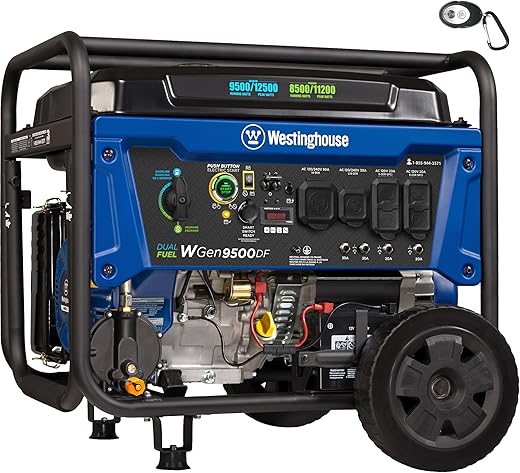




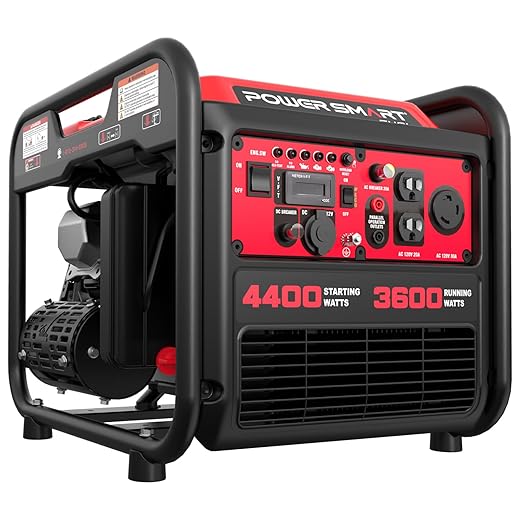
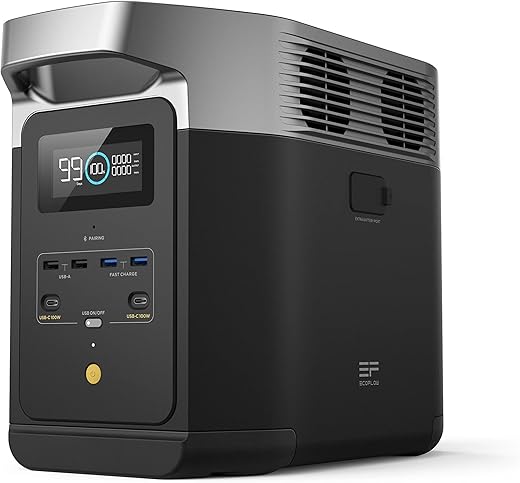
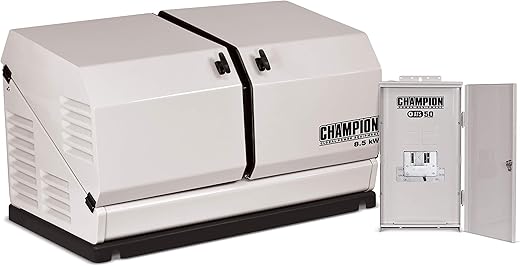
Great article! I love the pro and con lists. Makes it easy to decide what would work best for my needs.
This comparison is super helpful! I was totally confused about which generator to pick. Thanks for breaking it down!
I didn’t realize how much difference there could be in fuel options. Definitely leaning toward the tri-fuel now!